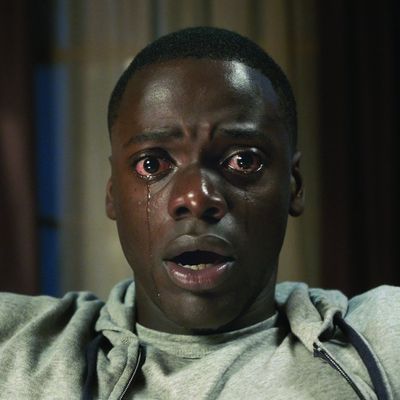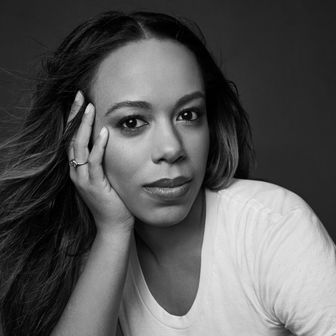
In one legendary Chappelle’s Show skit, comedian Paul Mooney wearily relays to the camera: “The black man in America is the most copied man on this planet, bar none. Everybody wanna be a nigga, but nobody wanna be a nigga.” His words are just as true now as when they were filmed over a decade ago, and I was reminded of them while watching Get Out, a movie that broadcasts the unique horror of the black experience in a white America.
On the surface, the premise of Get Out is relatively familiar: A photographer named Chris (played by Daniel Kaluuya) joins his girlfriend, Rose (Allison Williams), on a weekend trip to meet her family. Chris’s meet-the-parents anxiety is amplified when he learns that Rose, who’s white, hasn’t told her family that he is black. But after they arrive Chris’s worries fizzle. Missy and Dean, Rose’s parents, are pretty nice — albeit over-eagerly so. Jeremy (Rose’s brother) seems to be suffering from some sort of personal-aggression issue, however, and the family’s black maid and black groundskeeper are just plain weird.
America as a whole appropriates and fetishizes the unique qualities that outline many black people. Our lips, for example: They’re too overwhelming for black skin. Better if they fall on the face of a Kardashian. A black person with a sizeable ass is fat, but when that ass appears on a white body, like magic, it’s a trend. I’m sure you’re aware of the bleak stereotype that slots most natural-hair ladies as drug addicts. It’s true, unless they are white. Darling, that’s fashion. Get Out takes this everyday co-optation of black traits and black bodies and makes it horrifyingly literal. (Spoilers, naturally, to follow.)
Rose’s family, it turns out, runs an underground transplant operation where the brains of white people are inserted into the bodies of blacks. The black people are reduced to vessels — unable to control any movement or form of speech — as they helplessly observe their white captor carry out their former life. In the movie this stunted state of being in which the black person is forced to live the remainder of his or her days is called “the sunken place.”
The man who ultimately purchases Chris’s body is Jim, a blind art dealer. Jim doesn’t just lust over Chris’s eyes, he wants his black vision: The invaluable tool forged through a lifetime of black experiences, black struggles, black joy. It is the final step in this dystopian allegory of appropriation, where a black body is assumed, but the histories of the black being are left to erasure. Jim explains his decision this way: “What I want is so much deeper: Your eye, man. I want those things you see through.”
Get Out offers an indictment of how American society comprehends black people. Jordan Peele, who wrote and directed the movie, centers Chris in a merry-go-round of white people: They are friendly and marvel at him. Not once within the movie is a racial epithet spewed. There are no white hoods or Confederate flags to be seen. That’s the cleverness of the film. The troop of white characters loves everything about black people. Well, almost.
Just as American society metaphorically disembowels the black body within the everyday, so do the characters of Get Out. The criticism of white culture absconding with black features isn’t new, but it’s pretty smart how Peele transferred this conceit to a literal realm. In the movie the black body is a shiny car granted emotional, human value only after there’s a white driver at the wheel. It’s Peele’s way to undermine the belief that marveling at black bodies somehow counts as valuing black life.
And boy, white folks sure love to mull over the wonder of the black form. Slavers scrutinized the physical vigor and fitness on slaves in order to fatten their wallets; later, minstrel shows, where white people paraded in blackface on stage, hit their stride. But it doesn’t end there. Just a few weeks ago, Solange reminded us how the Grammy awards show has asked over 200 black artists to perform for the annual spectacle within the past two decades, but awarded only two black artists the top prize, Album of the Year. In Playing in the Dark, Toni Morrison writes: “Whiteness, alone, is mute, meaningless, unfathomable, pointless, frozen, veiled, curtained, dreaded, senseless, implacable.” Whiteness requires the recognition of an “other” in order to define itself. And, it seems, to make money and be entertained.
I thought about the question of entertainment as Chris lay trapped in “the sunken place.” Peele portrays the sunken place as a space-like darkness, save for a tiny television screen tuned to the horror of what Chris can see through his eyes. From this hellhole, life plays out as if Chris were paralyzed but still possessed the ability to see and hear. Tossing that concept into the real world, I thought of how elements of black culture are hijacked, wrapped, and flung back into society as fragments of their former selves. What do we do when we see Katy Perry touted as spearheading the “new baby hairs” trend? Iggy Azalea adopting a new dialect to push records? Elle Canada declaring the dashiki the “new ‘It’ item”? You watch helplessly, as if it were playing out on a screen, as black ownership of black culture loses its grip.
Jordan Peele has talked about how there’s an element of dehumanization when you can only see someone’s color and not the whole person. Kaluuya has addressed this too, telling Vulture about “the party scene, when everyone was highlighting how black Chris was and saying ‘black’ things and being nice. You kind of can’t say anything, because you know the intention is to make people feel welcome. However, the impact is making people feel isolated and different, because you just want to feel included, like you belong. That’s what the conflict is, and that’s what it captured.”
This specific kind of casual racism is wildly devastating: It’s recognizing a stranger has designated your race as your defining characteristic. When you’ve spent a lifetime becoming an interesting, thoughtful, well-rounded human, this oversimplification stings. But is your frustration overwrought? Maybe they were just trying to make you comfortable and didn’t know how to otherwise relate? And that’s the mindfuck.
Moments before Get Out ends, a police car wails closer and closer, offscreen in the near distance. It’s ominous: Chris is covered in his injured girlfriend’s blood. Though Rose is the murderous bad guy, Chris knows — and we know — that he’s reached a dire impasse. Peele has said that he wrote the original ending (which has a police officer confronting Chris and Rose) during a happier time in America, when Barack Obama first won the presidency. He swapped in Rod, Chris’s best friend, after the killing of Trayvon Martin. We deserved a hero, Peele said. But what does it say about me that before I saw Rod emerge from his TSA car I had already swallowed my bitter disappointment at Chris’s death-by-cop? What does it say about us that the most shocking plot point of a brain-transplanting horror movie is that the black guy doesn’t die?





